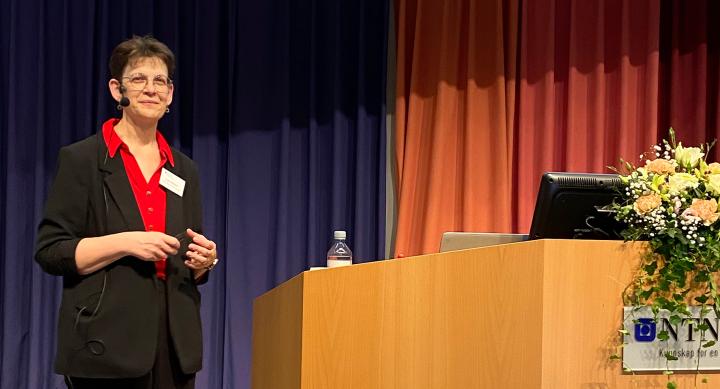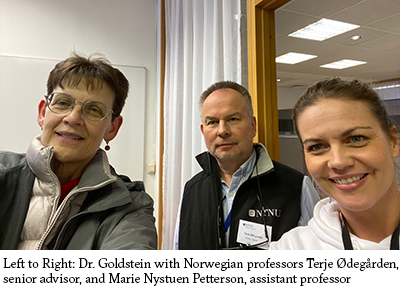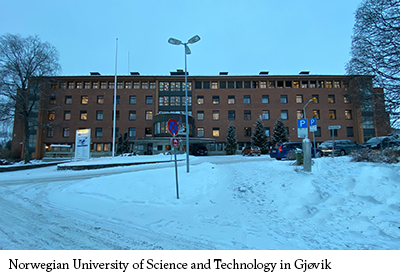
Leigh Goldstein, PhD, RN, ANP-BC, and director of the School’s Learning Enhancement and Academic Progress Center, remembers the day she received a phone call out of the blue from two professors from the Norwegian University of Science and Technology (NTNU) in Gjøvik, Norway, who were attending a health care simulation conference in San Antonio, Texas.
“They wanted to tour our Simulation and Skills Lab,” she said. “During the tour, they asked how we assess student competence when they are learning new skills. This question led to a discussion about student psychomotor skills testing and the high amount of stress and anxiety this causes, to some degree, in all nursing students. We included a demonstration of and discussion about our skills testing using our Student-Centered Skills Performance Exams Using Video and Peer-to-Peer Mentoring.”

The skills performance exams and peer-to-peer mentoring program was developed to provide a testing method that allows all students to test skills competence in a manner that reduces test anxiety while providing more opportunities for students to develop essential clinical skills by allowing them to record themselves performing specific high-volume, high-risk skills. Working in pairs, students perform skills, such as inserting IVs. Afterwards they review and critique each other’s performance prior to submitting a final version of the video for grading purposes.
“The difficulty in guaranteeing a full range of experience in outside settings, such as hospitals, has made learning clinical skills more challenging,” she said. “I wanted to change the way we measure student competence in high-risk skills.”
Dr. Goldstein and her team have collected four years of data, which so far have shown that the Student-Centered Skills Performance Exams Using Video and Peer-to-Peer Mentoring program helps reduce the stress and anxiety experienced during testing.
Soon after the professors’ visit, they contacted Dr. Goldstein about their continued interest in the testing method and requested another onsite visit for five NTNU nursing faculty who arrived in Austin for a four-day visit. They were given a big Texas welcome and the opportunity to participate in simulations, meet with groups of nursing faculty to exchange ideas, and spend a large amount of time learning the testing method, including speaking with students. They were impressed with what they saw and eager to implement it at their university.

They also invited Dr. Goldstein to Norway to be the keynote speaker at a conference at the Norwegian University of Science and Technology in Gjøvik. She arrived in Oslo in early February 2020 and spent the following four days speaking and visiting with faculty and students.
“How they deliver care is impressive,” Dr. Goldstein said. “For instance, they offer strong long-term care and support for seniors and are currently working on moving hospice care to home settings. They have a strong and successful universal health system.”
The NTNU faculty were working on the video performance exam implementation and hoped to have it operational by the end of 2020. Eventually, the UT Austin School of Nursing and the University of Science and Technology plan to develop an exchange program for both faculty and students, but these plans have been put on hold until the COVID-19 crisis is under control.
“I’m eager to go back as soon as possible, and we are working on a grant to aid a mutual exchange and sister school program,” Dr. Goldstein said. “In the meantime, we continue to work on competency testing and using this knowledge to improve pass rates for our own students.”